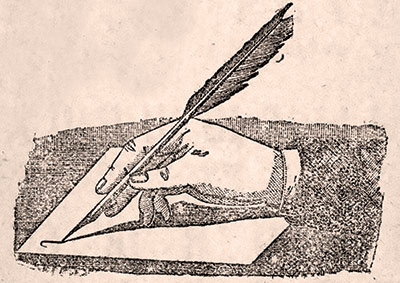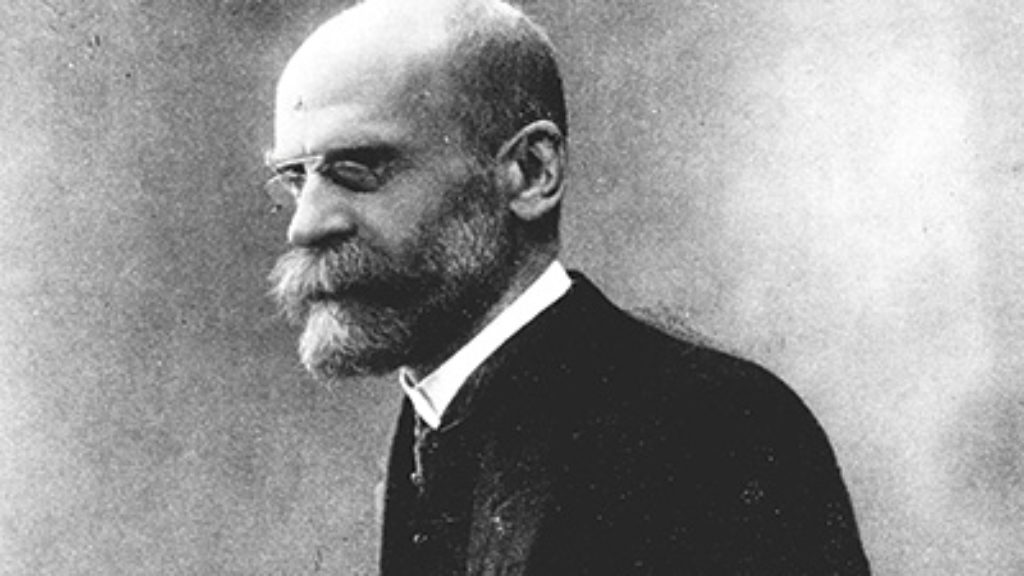Write a Modern Letter, Live a Modern Life
Imagine that you’re a woman living in a shtetl in 1900: what do you say in a letter to your husband in America if you think he’s cheating on you? You don’t write in Yiddish very often—certainly not the kind of artfully calibrated Yiddish likely to advance your cause. The last thing you want is to seem old-world or ungrammatical. You need a literary model, a template.
Or imagine you are this woman’s husband. You’ve received her wrenching yet thoroughly grammatical letter, and you need somehow to respond. In this case—and it is a real case, at least in the sense that it comes from a real Yiddish letter-writing manual—you’re provided with two possible responses. Response one: you love her; it’s true that you were flirting a little with the missus of the apartment where you’re boarding, but her letter is so heartfelt that you immediately saw the error of your ways, and here’s 300 rubles. Response two: Dear Rokhl, I am terribly sorry to tell you this, but I have contracted tuberculosis and am off to a sanatorium in Colorado. You will never hear from me again. My best to the children.

The brivnshteler, or letter-writing manual, is a forgotten artifact of Jewish life at the turn of the 20th century. These little self-help booksprovided prose to help Yiddish speakers navigate the modern world. In addition to teaching their readers whom to write to about the touchier issues of Jewish family life, courtship, and migration, these books offered models for business letters and other necessary correspondence. But it wasn’t all instruction: the letter manuals were the cheapest form of written entertainment in Yiddish, providing their readers with immigration dramas and exemplary tales of love found and lost; brivnshtelers cost even less than the popular works derided by sophisticates as shund (trash). Jewish letter-writing manuals go back at least as far as 12th-century Spain, to a manuscript that included models for requesting money for dowries and securing the redemption of captives. By the late 19th and early 20th centuries, over 30 different brivnshtelers by more than 20 authors had been published in the Russian and Austro-Hungarian Empires, with another handful in the United States. Many went through multiple printings. Abraham Cahan, the editor of the Forverts, even gave away copies of Alexander Harkavy’s 1902 Amerikanisher briefen-shteler un speller as a premium for new subscribers.
The increased number of Yiddish brivnshtelers published in the later 19th century is a reflection not only of changing educational expectations but also of a general concern about what it would take to prosper in the modern world. Yiddish speakers who wanted instruction in Gentile behavior could learn, say, from Frishman and Paperna’s 1911 quadrilingual (Yiddish, Hebrew, Russian, and Polish) Igron shalem, how to write a passionate love letter or a letter of friendship between men. Meanwhile, American readers of Alexander Harkavy’s 1902 guide could study the New World approach to courtship and friendship.
All the tumult of Jewish life was reflected in brivnshtelers: urbanization, industrialization, secularization, women, and mass migration out of Eastern Europe. The only important aspect of Jewish life one doesn’t find in these manuals is politics. Brivnshtelers from the Russian Empire were published under the eye of the tsarist censor (so no Zionism or Bundism), while writers of American manuals worked hard not to offend customers of any ideological stripe.
Of all the categories explored by brivnshtelers, one of the most compelling is correspondence between parents and children. Brivnshteler parents tend to have specific complaints: the son has not applied himself to his studies, he is not pursuing business, has not learned a trade, has not notified his parents of his ill health, has not written, or (occasionally) is spending his time on Gentile amusements.
In the excerpt below, Shloyme’s fictional parents give full voice to their anxiety:
Volkovishki, May 6, 1903
Beloved son, Shloyme!
Your letter did not bring us any pleasure. Don’t think that we expected anything else from you—we always said that this would be how your quest would end. You have robbed yourself of time and us—our health! What is it that you are running after? Do you lack for anything in your parents’ home, do we fall short in our service to you? We always told you: stay at home, study science [kentenise], look after business, and get out of your head your fantasy about earning money on your own and the free life. But you were stubborn and went off. Nu, what do you have to say now? . . . We wonder only why you are so foolish and ask you yet again, “Where will you turn and what will you do?” Come home, to your parents. Depend on them and heed what they tell you to do. We are sending you fifteen rubles in this letter for travel expenses and enough with all this foolishness.
Your parents,
Ezriel and Toyve Pozen
When children left for America, the stakes were even higher, and brivnshteler parents were not instructed to stint on emotional moralizing in writing to a now-distant child:
Lutsk, June 28, 1898
Khanele, my child!
I have received your letter of June 15. I kissed the paper on which I recognized my daughter’s handwriting, I even kissed the envelope with its American stamp.
The American stamp! It made me realize that my daughter, my sweet Khanele, is in America, on the other side of the ocean, at the end of the world. When did I ever imagine that my beloved child would end up so far away from me that I would lose the hope of seeing her?
But no! I won’t think of such things. I will hope that I will yet live to see my daughter at least one more time, to hug her and kiss her pretty cheeks one more time . . .
You have delighted me, my child, with the news that you are, thank God, in good health, and that you hope to find your good fortune in the new world, because you are being courted by many gallant young gentlemen.
To tell the truth, the expression “many gallant young gentlemen” leaves a bad taste in my mouth. I would have been more pleased if you had written me that one gallant young man was seeking to win your love, because from many young gentlemen a young girl’s head can spin, so that she doesn’t know what to do, whom to choose from among them. My child! Do you understand that a young girl must be careful these days when she is surrounded by so many suitors? Are you familiar with the sort of people that most of these suitors tend to be?
I must admit that I have just asked you a stupidquestion. How would you know about such things? You are still a young child, you were brought up in a small shtetl, and you are still unskilled in the ways of the wider world, so I consider it my responsibility, my child, to make you aware of a few important matters that can help you protect yourself against great misfortune. You should know, my daughter, that big-city young gentlemen are not stingy with their compliments to a pretty girl. Most of them do not really mean the words that come out of their mouths, so you shouldn’t believe every one of them. Even if one of them kneels before you and swears that his love for you is great and eternal, you should thoroughly, very thoroughly investigate whether his vow is true, because there are many scoundrels in the world who, in order to attain their own dark ends will not hesitate to swear to anything.
And when you are finally convinced that a young man sincerely loves you and truly intends to marry you, you must first of all know how to deal with him. Don’t give yourself over completely into his hands. You must use all your resources to make sure that he won’t lose respect for you, because love without respect will very quickly come to an end. He must respect you and this you can only pull off if you hold him at a certain distance from yourself.
These sorts of things can’t be written about in detail. But I believe that a smart child like you will understand the sense of my words.
I wait with the greatest impatience to hear news of your engagement to a fiancé who is worthy of possessing you. Write to me often, my daughter, very often, so that with your letters you will delight your mother, who thinks always only of you.
Devoyre
Of course, the brivnshteler also imagined ideal children among its clients and characters. Here is the pious “Sholem Birenboym” (though such a letter could also be copied by a less truly pious son):
Warsaw, B’Bekhukosay [be-khukotay], 1888
Shalom to my beloved father, my great teacher, the noble, shining star of our generation, Moyshe Birenboym.
I am writing to inform you, dear father, that yesterday, I arrived safely at my destination, and my dear uncle welcomed me with all-embracing love and honor, and also gave me my own room in which to sit and study. I am very happy that I came here because I will be able to achieve the goal that I have striven for all my life. Also, all the children of the house love me a lot. . . .
Now, I am asking you, dear Father, to demonstrate your good heart and send me money . . . I am embarrassed to go among people in ripped clothing. I also need a few rubles for different bikher and sforim [secular and religious books] because without tools there is no master craftsman, and without sforim, one can’t study. I expect that you will grant my request quickly and will immediately send me everything I need. Your son who respectfully awaits your reply,
Sholem Birenboym
As important (and entertaining) as these little manuals were over the last decades of the 19th century and the first decades of the 20th, the genre did not survive World War I. As the availability of Yiddish books and newspapers increased and modern Yiddish schools became more widespread in Poland, Lithuania, Latvia, and (briefly) the Soviet Union, the market for such manuals dried up. But they remain a window onto the years when Yiddish-speaking Jewry became modern.
Editor’s Note: Portions of this article are adapted from the book Dear Mendl, Dear Reyzl: Yiddish Letter Manuals from Russia and America (Indiana University Press).
Suggested Reading

Workday Jews
In their respective books, Chad Alan Goldberg and Eliyahu Stern address the question of whether the Jews are the quintessentially modern people or a people who came to modernity late and with a sudden shock. They reach very different conclusions.
“I Am Talking to You Like King Solomon”
Saul Bellow once called Nabokov a “cold narcissist.” His letters to his wife, Véra, decisively dispel that common misconception.
Letters From Chicago
One of the many pleasures of the recently published Saul Bellow: Letters is how it reacquaints us with Bellow's wry, poignant, infectiously erudite voice. This is all the more surprising because he wasn't, or at least so he insisted, a natural-born letter writer. As in his literature, Bellow's language is so stunning that one wonders whether he was writing to both his correspondents, and to readers like us.
“I Am Impossible”: An Exchange Between Jacob Taubes and Arthur A. Cohen
In the summer of 1977, two old friends ran into each other in front of a Paris bookstore and found themselves arguing about Simone Weil, Judaism, and their lives.
Comments
You must log in to comment Log In